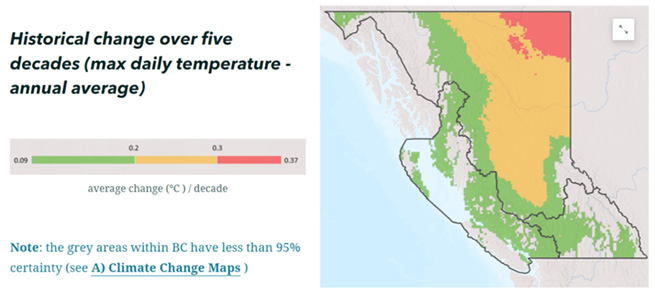When incorporating climate change into your next forest operations plan, the Climate Vulnerability Forest Management (CVFM) tool may be a useful resource. The CVFM tool shows the historical and projected trends for climate indicators identified to be most related to climate events that impact forest operations.
The tool graphically highlights differences in climate indicators between regions, lists which climate indicators are linked to forest operations activities, and provides examples of adaptive changes to forest operations.
 A screenshot of the CVFM tool showing historical trends for average annual maximum daily temperature—a proxy for dry-condition climate events using historical data from 1950 to 2012.
A screenshot of the CVFM tool showing historical trends for average annual maximum daily temperature—a proxy for dry-condition climate events using historical data from 1950 to 2012.
The project involved processing datasets created by Pacific Climate Impacts Consortium, organizing FPInnovations-led workshops around B.C., leveraging past FPInnovations experiences in approaching climate assessments, and working with the highest-resolution climate model outputs available. FPInnovations is also able to provide members raw or processed climate model output data for other provinces and help in the identification and optimization of possible adaptations.
The CVFM tool was developed by FPInnovations’ Transportation and Infrastructure group, with the support of the B.C. Ministry of Forests. Its contents will be maintained and updated as climate models develop, understanding of climate science improves, and feedback from users of the tool is received. The tool is publicly available and there is no cost to use it.
Access the CVFM tool here.
For more information, contact
Source: FPInnovations
